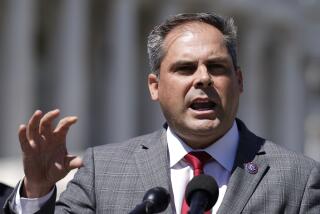Dornan and Liberals Back Plan for U.S. ‘Police Corps’
WASHINGTON — Joining two of the House’s most liberal Democrats, conservative Republican Rep. Robert K. Dornan on Wednesday endorsed a plan to create a national “police corps” that would recruit 25,000 new officers each year by offering to pay for their college education.
“This is certainly not an ideological issue, this is a survival issue,” said Dornan of Garden Grove, who is a co-sponsor of police corps legislation introduced in the House.
In an unusual display of bipartisanship, Dornan stood shoulder to shoulder at a Capitol press conference with two liberal Democrats from Massachusetts: Reps. Joseph P. Kennedy II and Barney Frank, co-sponsors of the bill. Another co-sponsor, Rep. John Lewis (D-Ga.), is a former chairman of the Student Non-Violent Coordinating Committee, which led black civil rights protests in the 1960s.
“The criminals have gotten more sophisticated, the criminal law has gotten more sophisticated,” said Frank, who is at loggerheads with Dornan on most issues. “It’s part of our job to see that the level of sophistication among the good guys keeps up with that.”
Lewis, who chaired SNCC from 1963 to 1966, said in a prepared statement: “This is a bill that is vital to black Americans. . . . The police corps represents a commitment to check and reverse the tide of insensate violence that has crippled so many black communities.”
The bill also has won the support of several major police organizations, including the Fraternal Order of Police, the International Brotherhood of Police Officers and the Federal Law Enforcement Officers Assn., the legislators said.
Modeled after the military’s Reserve Officer Training Corps, the police corps would pay up to $10,000 a year in college expenses for those applicants who serve as police officers for four years upon graduation from college.
The payments would be made only after the candidates complete their police service. In the interim, educational expenses would be financed by student loans or paid directly by the student. Police salaries would be paid by each local or state police department.
The police corps program would recruit a maximum of 25,000 new officers a year, and the average annual assistance probably would amount to about $5,000, one congressional aide said. The maximum payment for a four-year period would be $40,000.
The bill would create an Office of the Police Corps within the Department of Justice that would be headed by a director appointed by the President and approved by the Senate.
If enacted, the program’s annual estimated cost would grow to $490 million in 1993, where it would remain, said Sen. Arlen Specter (R-Pa.), one of the bill’s sponsors in the Senate. Another sponsor is Sen. Jim Sasser (D-Tenn.), chairman of the Senate Budget Committee.
Dornan, a strong supporter of President Bush in the 1988 election campaign, said he believes that the White House would eventually support the measure. A spokeswoman at the White House press office said the Administration would have no comment at least until Bush returns from Europe.
Despite the display of bipartisanship, Dornan and Frank managed to demonstrate their widely diverse perspectives.
Referring to the Administration’s announced plan to wage a war on crime, Dornan said, “I don’t believe we’re really fighting it like a war yet because we’re not mobilizing the reserves. That was the big mistake we made in Vietnam, right?”
As Dornan spoke the words, Frank, who opposed the Vietnam War, raised his eyebrows and rolled his eyes.
The idea behind the police corps proposal was developed in the early 1980s by a group that included Adam Walinsky, a former aide to the late Sen. Robert F. Kennedy, and former Philadelphia police officer Jonathan Rubenstein, author of a widely respected book on big-city police work.
In an interview after the press conference, Walinsky said it was no accident that he secured the support of legislators whose political perspectives vary as widely as those of Dornan and Frank.
“Democrats have shied away from crime (issues), and Republicans haven’t wanted to go near the issues of the inner city. Now these guys are ready to do it,” Walinsky said. Referring to the legislation, he added: “We need that kind of broad support. We need that bracketing. We’re trying to make it bulletproof.”
NATIONAL ‘POLICE CORPS’
Republicans such as Garden Grove Rep. Robert K. Dornan are joining liberals to propose a “police corps” of college graduates. Some details: Modeled after the military’s Reserve Officer Training Corps, the police corps would pay up to $10,000 a year in college expenses for applicants who serve as police officers for four years upon graduation from college.
The payments would be made only after the candidates complete their police service. Meanwhile, educational expenses would be financed by student loans or paid directly by the student.
The police corps program would recruit a maximum of 25,000 new officers a year, and the average annual assistance probably would amount to $5,000.
The bill would create an Office of the Police Corps within the Department of Justice that would be headed by a director appointed by the President.
More to Read
Get the L.A. Times Politics newsletter
Deeply reported insights into legislation, politics and policy from Sacramento, Washington and beyond. In your inbox three times per week.
You may occasionally receive promotional content from the Los Angeles Times.










